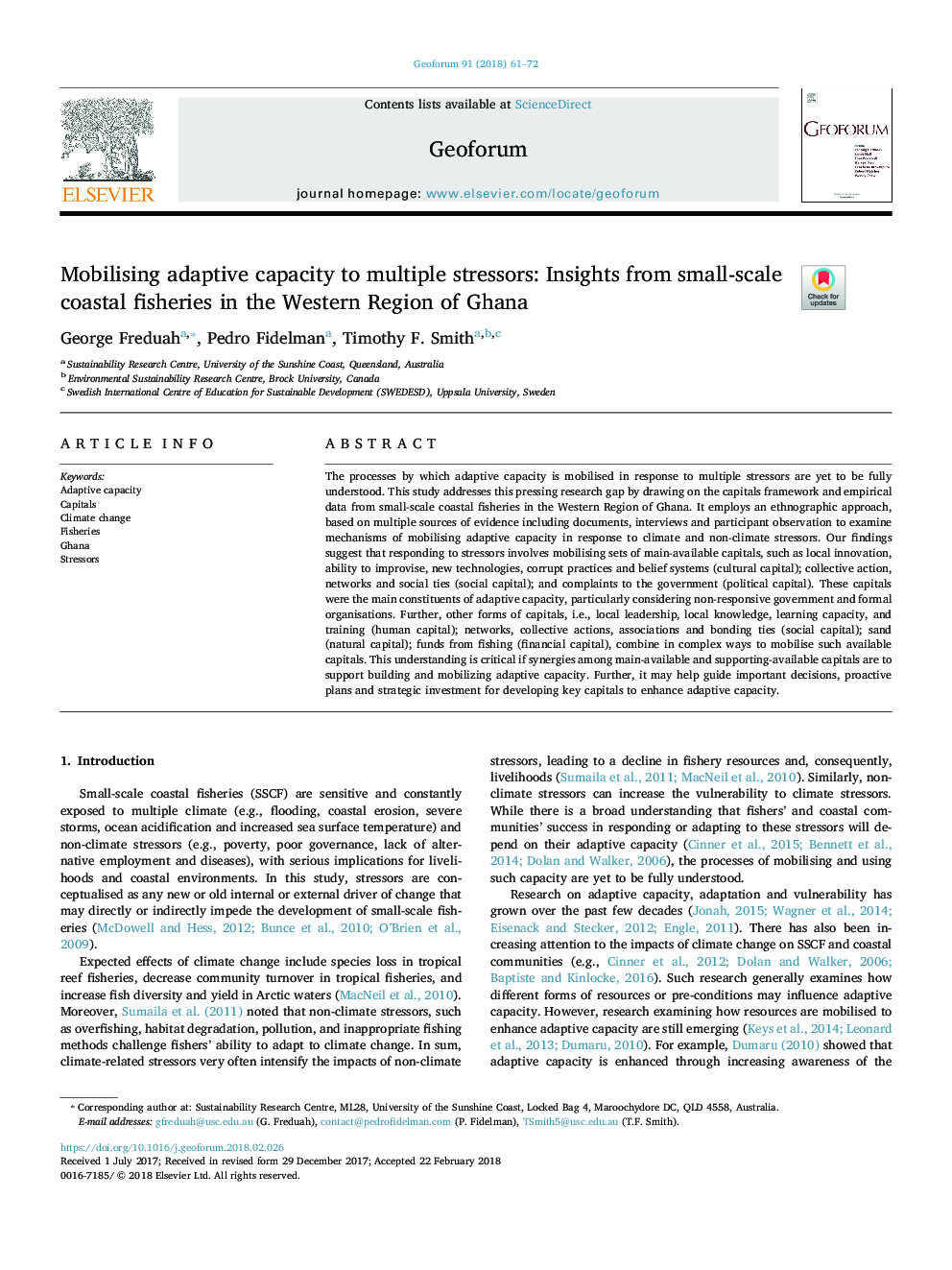| کد مقاله | کد نشریه | سال انتشار | مقاله انگلیسی | نسخه تمام متن |
|---|---|---|---|---|
| 7353519 | 1477098 | 2018 | 12 صفحه PDF | دانلود رایگان |
عنوان انگلیسی مقاله ISI
Mobilising adaptive capacity to multiple stressors: Insights from small-scale coastal fisheries in the Western Region of Ghana
ترجمه فارسی عنوان
بسیج ظرفیت انطباق به چند عامل استرس زا: بینش از ماهیگیری ساحلی کوچک در منطقه غربی غنا
دانلود مقاله + سفارش ترجمه
دانلود مقاله ISI انگلیسی
رایگان برای ایرانیان
کلمات کلیدی
ظرفیت سازگاری، پایتخت ها، تغییر آب و هوا، شیلات، غنا، استرس
ترجمه چکیده
فرایندهایی که ظرفیت انطباق در پاسخ به عوامل استرسزا بسیج می شود هنوز به طور کامل درک نشده اند. این مطالعه با توجه به چارچوب های سرمایه گذاری و داده های تجربی از ماهیگیری ساحلی کوچک در منطقه غربی غنا، این شکاف تحقیق فشرده را مورد توجه قرار می دهد. این روش رویکرد قوم نگاری را بر مبنای منابع متعدد شواهد از جمله اسناد، مصاحبه ها و مشاهدات شرکت کنندگان برای بررسی مکانیزم های بسیج ظرفیت انطباق در پاسخ به عوامل استرس زای جو و غیر آب و هوایی استفاده می کند. یافته های ما نشان می دهد که پاسخ به استرسورها شامل بسیج مجموعه های سرمایه های اصلی موجود می شود، از جمله نوآوری محلی، توانایی بداهه، تکنولوژی های جدید، شیوه های فاسد و سیستم های اعتقادی (سرمایه فرهنگی)؛ اقدام جمعی، شبکه ها و روابط اجتماعی (سرمایه اجتماعی)؛ و شکایت به دولت (سرمایه سیاسی). این پایتخت ها اجزای اصلی ظرفیت سازگاری بود، به خصوص با توجه به دولت های غیر رسمی و سازمان های رسمی. علاوه بر این، دیگر انواع سرمایه ها، یعنی رهبری محلی، دانش محلی، ظرفیت یادگیری، و آموزش (سرمایه انسانی)؛ شبکه ها، اعمال جمعی، انجمن ها و روابط پیوند (سرمایه اجتماعی)؛ شن و ماسه (سرمایه طبیعی)؛ بودجه از ماهیگیری (سرمایه مالی)، به روش های پیچیده ای برای بسیج کردن چنین سرمایه های موجود ترکیب می شود. این درک مهم است اگر همکاری در میان سرمایه های اصلی موجود و پشتیبانی موجود برای حمایت از ساخت و بسیج ظرفیت انطباق باشد. علاوه بر این، این ممکن است به هدایت تصمیمات مهم، برنامه های پیشگیرانه و سرمایه گذاری استراتژیک برای توسعه کلیدی برای افزایش ظرفیت سازگاری کمک کند.
موضوعات مرتبط
علوم انسانی و اجتماعی
اقتصاد، اقتصادسنجی و امور مالی
اقتصاد و اقتصادسنجی
چکیده انگلیسی
The processes by which adaptive capacity is mobilised in response to multiple stressors are yet to be fully understood. This study addresses this pressing research gap by drawing on the capitals framework and empirical data from small-scale coastal fisheries in the Western Region of Ghana. It employs an ethnographic approach, based on multiple sources of evidence including documents, interviews and participant observation to examine mechanisms of mobilising adaptive capacity in response to climate and non-climate stressors. Our findings suggest that responding to stressors involves mobilising sets of main-available capitals, such as local innovation, ability to improvise, new technologies, corrupt practices and belief systems (cultural capital); collective action, networks and social ties (social capital); and complaints to the government (political capital). These capitals were the main constituents of adaptive capacity, particularly considering non-responsive government and formal organisations. Further, other forms of capitals, i.e., local leadership, local knowledge, learning capacity, and training (human capital); networks, collective actions, associations and bonding ties (social capital); sand (natural capital); funds from fishing (financial capital), combine in complex ways to mobilise such available capitals. This understanding is critical if synergies among main-available and supporting-available capitals are to support building and mobilizing adaptive capacity. Further, it may help guide important decisions, proactive plans and strategic investment for developing key capitals to enhance adaptive capacity.
ناشر
Database: Elsevier - ScienceDirect (ساینس دایرکت)
Journal: Geoforum - Volume 91, May 2018, Pages 61-72
Journal: Geoforum - Volume 91, May 2018, Pages 61-72
نویسندگان
George Freduah, Pedro Fidelman, Timothy F. Smith,
